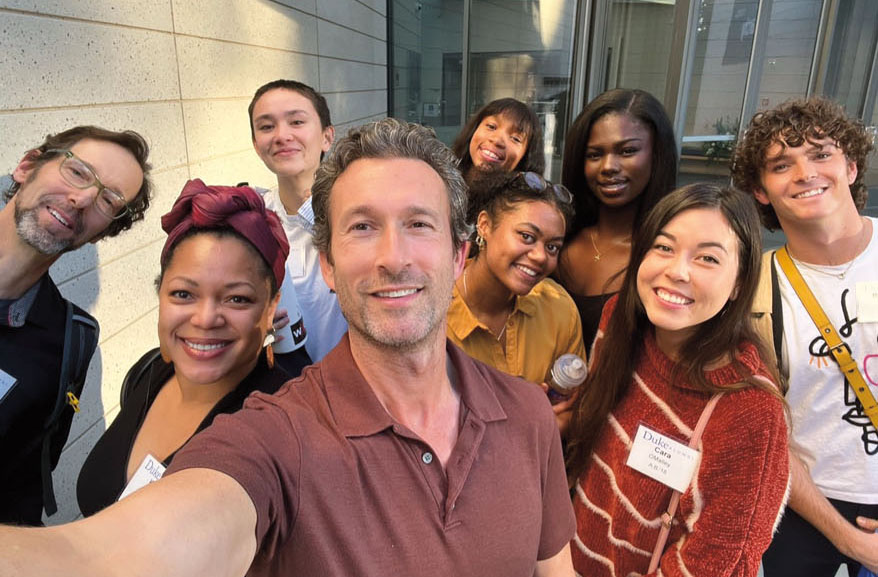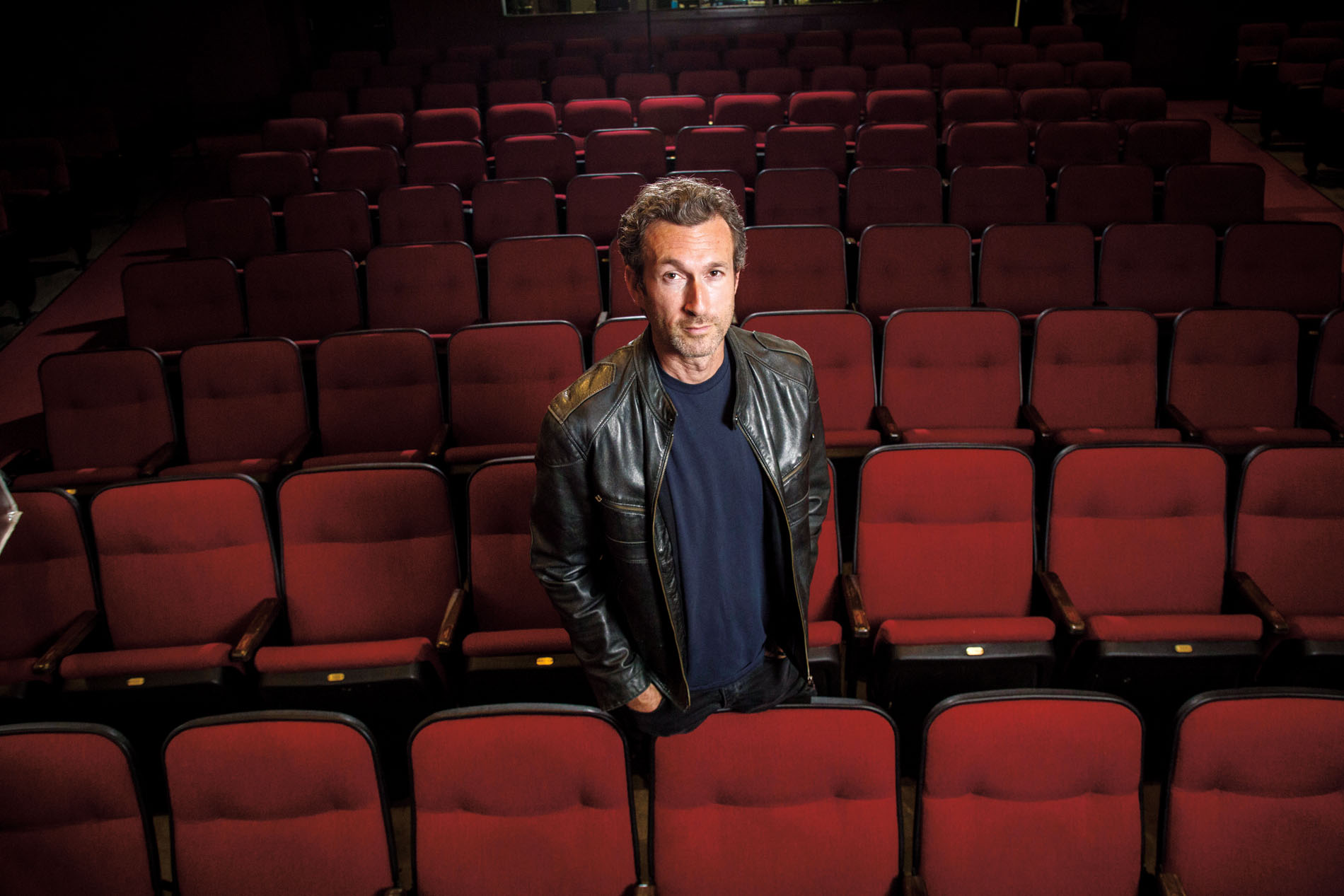On an April evening, a school auditorium audience in north Greensboro listened, rapt, as actor Aaron Lazar ’98 spoke about his life with ALS, formerly known as Lou Gehrig’s disease. As if to prove he still could, Lazar stood and began to sing. His singing voice erupts past his speaking voice like a train blasting past a crossing. “To dream the impossible dream / to fight the unbeatable foe,” he belts. “To bear with unbearable sorrow / to run where the brave dare not go.” “The Impossible Dream,” from the musical “Man of La Mancha,” is also the title of Lazar’s performance that evening. Lazar, too, has an impossible dream. He has decided to live.
“If the disease progresses and continues to take away my ability to enjoy a physical life in this body, my mission is to keep believing and keep manifesting [positive change] despite that,” Lazar, 48, says. “I don't spend too much time on that side of the coin.”
Lazar is a stage and screen actor whose Broadway credits include “The Light in the Piazza,” “Les Misérables” and “A Little Night Music.” On the big screen, he appeared in “The Wolf of Wall Street,” “Everything Everywhere All at Once” and a few Avengers movies – as Doctor Strange’s body double. He even shared screen time with Michelle Obama on an episode of the TV show “Black-ish.” In those days, Lazar was almost too driven to appreciate his successes. He was too focused on landing the next role, and the role after that. But after he was diagnosed in 2022 with amyotrophic lateral sclerosis, a degenerative and almost always terminal disease, Lazar clarified his priorities.

Acting is still his career, but it no longer gets between him and his life.
“My entire life hinged around work. Now it's very different,” Lazar says. “The future is full of quality time. [It’s] filled with love, with my kids.” Lazar lives in Los Angeles with his two sons from his first marriage and his fiancée, Nawal Bengholam.
Lazar didn’t find this live-in-the-moment optimism overnight. ALS was a shock. Old friend Michael Bogner ’98 has been by Lazar’s side for the entire journey. Bogs, as his friends call him, was in the room with Lazar the first time a doctor mentioned ALS.
“The doctor was very clear. The patient, understandably, could not hear it,” Bogner says. “[Lazar] was on the phone with people, saying ‘Well, they’re not sure.’ I was the one who was feeling sick.”
Lazar and Bogner met the first few days of their freshman year at Duke. They (and their friend group) had a lot in common. They were New Jersey kids – many from Jewish families, many from public school backgrounds. Bogner, a lawyer, describes himself as the grounded, linear half of their friendship. Lazar is a seeker, Bogner says, but he pursues his dreams tenaciously. After Duke, for example, the two both wound up in New York. Bogner arrived three years after Lazar, but that was all the time Lazar needed to land Broadway roles.
Becoming an actor was Lazar’s first impossible dream. It came true at the end of a 2000 performance of “Man of La Mancha” at the University of Cincinnati’s College-Conservatory of Music, where he studied musical theater. The musical ended as the lead – Lazar – left the stage. The lights went down, the sound effect of an iron door shutting resonated through the theater, and Lazar burst into tears.
“I just knew that my life had changed. This is what I was meant to be doing with my life,” Lazar says.
Two decades later, Lazar realized an even greater impossible dream. He spent the half-year between his first ALS symptoms in June 2021 and his January 2022 diagnosis depressed, anxious and unable to sleep. When he was formally diagnosed with ALS, though, it was as if a switch flipped in his mind.
“I had to change myself,” Lazar says. “I just had no interest in living in fear and negativity and sadness and trauma anymore.”
Before symptoms, Lazar lived for the credits on his Wikipedia page. Yet his body could no longer hold excess adrenaline or chronic stress.
Positivity and living in the moment take work. Living with a terminal diagnosis means riding out the rough days, which Lazar compares to surfing. Shortly before the Greensboro show, for instance, Lazar had been stressing about work and family. Then he tried to pick up a pot in his kitchen. His arm didn’t want to hold it. ALS was progressing before his eyes.
“I started to get really angry and sad,” Lazar says. “I was consciously aware that I’m not going to speak about this the way I used to. I'm not going to give it any more power.”
Rather than suppress his emotions, he let himself feel them. He gave them space, but not power, and within 15 or 20 minutes he felt OK.
“He has a wonderful family and a supportive fiancée and friends. But this is a tough diagnosis,” says Bogner. “It is a tough disease. And it is one that requires tremendous help.”
Nowadays, Bogner travels with his friend. Lazar performs “The Impossible Dream,” gives interviews, does clinics with drama kids while Bogner has his back – and keeps him on track. Before ALS, Lazar was bad at accepting help. Today, he calls Bogner his champion.
“That guy is my brother,” Bogner says, then chuckles. “We fight like brothers. Please...”
If Lazar is different, so is his newest show. Onstage in Greensboro, he’s vulnerable and honest and sometimes afraid. After, he sticks around as long as attendees – some of whom also have ALS – want to talk. The crowd dwindles. As it does, a man in a power wheelchair pauses near the exit. From the stage, Lazar makes sure to meet his gaze, makes sure to raise a hand, makes sure to have a long, meaningful moment with someone in the same boat.
“I could sit at home,” says Lazar. “But that's not really a choice for me.”
